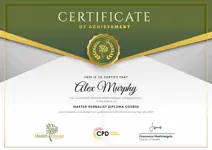Criminal Investigation
Level 7 QLS Endorsed Advanced Diploma! 180 CPD Point| 19 Audio Visual Lesson| Free Student ID Card & Assessment Included
Academy for Health & Fitness
Summary
- CPD Accredited Certificate - £10
- Advanced Diploma in Criminal Investigator at QLS Level 7 - £139
- Exam(s) / assessment(s) is included in price
- Tutor is available to students
Add to basket or enquire
Overview
48-Hour Knowledge Knockdown! Prices Reduced Like Never Before!
Discover the truth behind popular crime dramas and the real-world skills that are needed to stop law-breakers in their tracks when you take our popular Criminal Investigator course. Media entertainment often glamorises the work of police officers and detectives, but the fact remains that thousands of hard-working and talented people devote their careers to solving crime and catching perpetrators.
This Advanced Diploma in Criminal Investigator at QLS Level 7 course is endorsed by The Quality Licence Scheme and accredited by CPDQS (with 180 CPD points) to make your skill development and career progression related to Criminal Investigation substantial and easier than ever!
You can find out exactly how professionals perform this role by studying the contents of this tutorial. Written with the aid of industry experts, each module explains the methods and principles of investigating a crime scene and acting on criminal intelligence. You will be shown the total learning curve for expert investigation work, from collecting physical evidence to DNA analysis and understanding criminal psychology. The contents even cover the requirements for operating as a private detective and how to ensure that you adhere to the UK criminal justice system during the proceedings.
Upon successful completion of the Criminal Investigation course, you will receive an instant e-certificate as proof of the comprehensive skill development and competency. Add these amazing new skills to your resume and boost your employability by simply enrolling on this Criminal Investigation course.
With this comprehensive Criminal Investigation course, you can achieve your dreams and train for your ideal career. The Criminal Investigation course provides students with an in-depth learning experience that they can work through at their own pace to enhance their professional development.
You'll get a Free Student ID card by enrolling in this Criminal Investigation course. This ID card entitles you to discounts on bus tickets, movie tickets, and library cards.
Enrolling on the Criminal Investigation course will ensure that you land your dream career faster than you thought possible. Stand out from the crowd and train for the job you want with the Criminal Investigation program.
Key Topics to Be Covered by Criminal Investigation
- Fundamental requirements for crime investigation and detection
- Collecting the evidence and analysing the crime scene
- Understanding the use of psychology and intelligence gathering
- Working with the victim and learning about criminal motives
- Advance forensics and the UK criminal justice system
Achievement
Certificates
CPD Accredited Certificate
Digital certificate - £10
Advanced Diploma in Criminal Investigator at QLS Level 7
Hard copy certificate - £139
After successfully completing the Advanced Diploma in Criminal Investigator at QLS Level 7 course, you can order an original hardcopy certificate of achievement endorsed by the Quality Licence Scheme. The certificate will be home-delivered, with a pricing scheme of —
- 139 GBP inside the UK
- 149 GBP (including postal fees) for international delivery
CPD Accredited Certificate
- 29 GBP for Printed Hardcopy Certificate inside the UK
- 39 GBP for Printed Hardcopy Certificate outside the UK (international delivery)
CPD
Course media
Description
Why Prefer this Criminal Investigation Course?
- Opportunity to earn a certificate endorsed by the Quality Licence Scheme and another certificate accredited by CPDQS after completing this course
- Student ID card with amazing discounts — completely for FREE! (£10 postal charges will be applicable for international delivery)
- Standards-aligned lesson planning
- Innovative and engaging content and activities
- Assessments that measure higher-level thinking and skills
- Complete the program in your own time, at your own pace
- Each of our students gets full 24/7 tutor support
*** Course Curriculum ***
Here is the curriculum breakdown of this course:
Module 01: Required Skills to Become a Criminal Investigation
- Definition of a Crime Investigator
- Roles and Responsibilities of a Criminal Investigation
- Necessary Skills of a Criminal Investigation
- Thinking Process
- Decision Making
- The Investigative Mindset
- The Code of Ethics
- The Pathway to Becoming a Criminal Investigation
- Career as a Criminal Investigation
Module 02: An Introduction to a Private Detective
- What is a Private Detective?
- Roles and Responsibilities of a Private Detective
- Duties of a Private Investigator
- Skills and Characteristics Required to be a Good Private Detective
- Need and Scope of Private Detective
- Dangers faced by Private Detective
- Career as a Private Detective
Module 03: Criminal Intelligence
- An Introduction to Intelligence
- The intelligence process
- National Intelligence Model: the United Kingdom
- Analysis and analytical Process
Module 04: Crime Scene Investigation
- Introduction
- Policy Goals and Objectives
- Evidence Collection
- Actions of the Initial Responding Officer
- Processing Methodology
- Narrative Descriptions
- Crime Scene Photography
Module 05: Collecting and Packaging Physical Evidence
- Locating Physical Evidence
- Collecting and Packaging Physical Evidence
- Handling Evidence
- Packaging Evidence
- Biological Materials
- DNA Evidence
- Maintaining The Chain of Custody
- Obtaining Standard/Reference Samples
- Submitting Evidence To The Laboratory
- Ensuring Crime Scene Safety
Module 06: Fingerprints: Your Signature
- Getting a Grip on Fingerprints
- Developing The Science: A Trip Through Fingerprint History
- Measuring bodies: A precursor to fingerprinting
- Using Ridge Patterns
- Grouping by arches, loops, and whorls
- Developing the Henry System
- Using Chemistry to Expose Prints
- Cleaning up the Print: Digital Techniques
Module 07: DNA Analysis
- Overview
- The Function and Structure Of DNA
- DNA Identification
- Collection And Preservation of DNA Evidence
- Preparing DNA Samples For Fingerprinting
- Summary
Module 08: Criminology and Criminal Psychology
- Criminology
- Definition of Crime
- Types of Crime
- Classification of Crime
- Psychology and Criminal Psychology
- Open Source of Information
Module 09: Violent Crimes and Cyber Criminology
- Violence and Conflicts
- Crime and Social Media
- Why Cybercrime Occurs
- The Dark Web
- Detecting cyber attackers
- Threat Analysis and Prediction
Module 10: Business Theft and fraud
- Major Types of Fraud and Corruption
- Identify Theft
- Crime in the Corporate Sector
- Corruption and Fraud in Policing
- Fraud and Corruption in Times of Disaster
Module 11: Domestic Investigation and Types
- Defining Domestic Abuse
- Role of Investigators in Domestic Abuses
- Marital cases
- Divorce cases
- Child Abuse
- Elder Abuse
- Asset investigation
Module 12: Victimology
- Introduction to Victimology
- A Constructive View
- Expectations of the Victim
- Communication of Victimisation
Module 13: Dealing with Crime
- Overview
- The Investigative Function
- Supporting Activities
- Conducting Investigations
- Organization and Management
Module 14: Tracing and Surveillance Techniques
- Overview
- Smart Visual Surveillance
- Gait Recognition
- Attribute Analysis
- Surveillance for Security and Defense
Module 15: Effective Interrogation Techniques
- The Search for Truth
- Psychophysiological Basis of Forensic Assessment
- Interview vs Interrogation
- Question Formulation
- Nonverbal Behavioral Assessment
Module 16: Basic Operations of Firearms
- Introduction
- Types of Firearms
- Ammunition
- Laser Sights
- Quality Practice
- Dry Practice
- GPS of Personal Defense
Module 17: Firearms Examination
- Characteristics of Firearms
- Ammunition
- Firearms Evidence
- Gunshot Residue (GSR) Analysis
- Collecting Firearms Evidence
- Handling of Firearms
- Cartridge Cases
- Bullets
- Test Firing
- Powder Pattern Examination
Module 18: Forensic Psychology
- Introduction
- Ethical Principles
- Forensic Science
Module 19: The Criminal Justice System in England and Wales
- Overview
- What is Criminal Justice
- Criminal Justice: Functions and Form
- Criminal Justice In England and Wales
- Serious and Organized Crime Agency (SOCA)
- Aims of the Criminal Justice System
Assessment Process
We offer an integrated assessment framework to make the process of evaluation and accreditation for learners easier. You have to complete the assignment questions given at the end of the course and score a minimum of 60% to pass each exam. Our expert trainers will assess your assignment and give you feedback after you submit the assignment.
You will be entitled to claim a certificate endorsed by the Quality Licence Scheme after you have completed all of the exams.
Who is this course for?
This course does not require you to have any prior qualifications or experience. So you can enrol and start learning at your convenience. However, this could be a perfect match for,
- Anyone interested in this area
- People interested in Criminology and Criminal Science
- Students who have recently graduated and are looking for work
- Intern Lawyer planning to start practice in the criminal law court
- Those who want to get professional expertise in this field
- Existing professionals looking for a certificate
Requirements
This course does not require any prior knowledge; everyone may participate! This course is open to anyone interested in learning from anywhere in the world.
Every student must be over the age of 16 and have a passion for learning and literacy.
This 100% online course can be accessed from any internet-connected device, such as a computer, tablet, or smartphone. This Criminal Investigation course allows you to study at your own speed and grow a quality skillset.
Career path
The Criminal Investigation course aims to help you get the job-required know-how or even the long-awaited promotion of your dreams. With the support and proper guidance, you will learn the skills and knowledge that will help you secure a job as:
- Private Investigator
- Criminology
- External Fraud Analyst
- Internal Fraud Analyst
- Criminal Psychologist
Questions and answers
Currently there are no Q&As for this course. Be the first to ask a question.
Reviews
Currently there are no reviews for this course. Be the first to leave a review.
Legal information
This course is advertised on reed.co.uk by the Course Provider, whose terms and conditions apply. Purchases are made directly from the Course Provider, and as such, content and materials are supplied by the Course Provider directly. Reed is acting as agent and not reseller in relation to this course. Reed's only responsibility is to facilitate your payment for the course. It is your responsibility to review and agree to the Course Provider's terms and conditions and satisfy yourself as to the suitability of the course you intend to purchase. Reed will not have any responsibility for the content of the course and/or associated materials.




